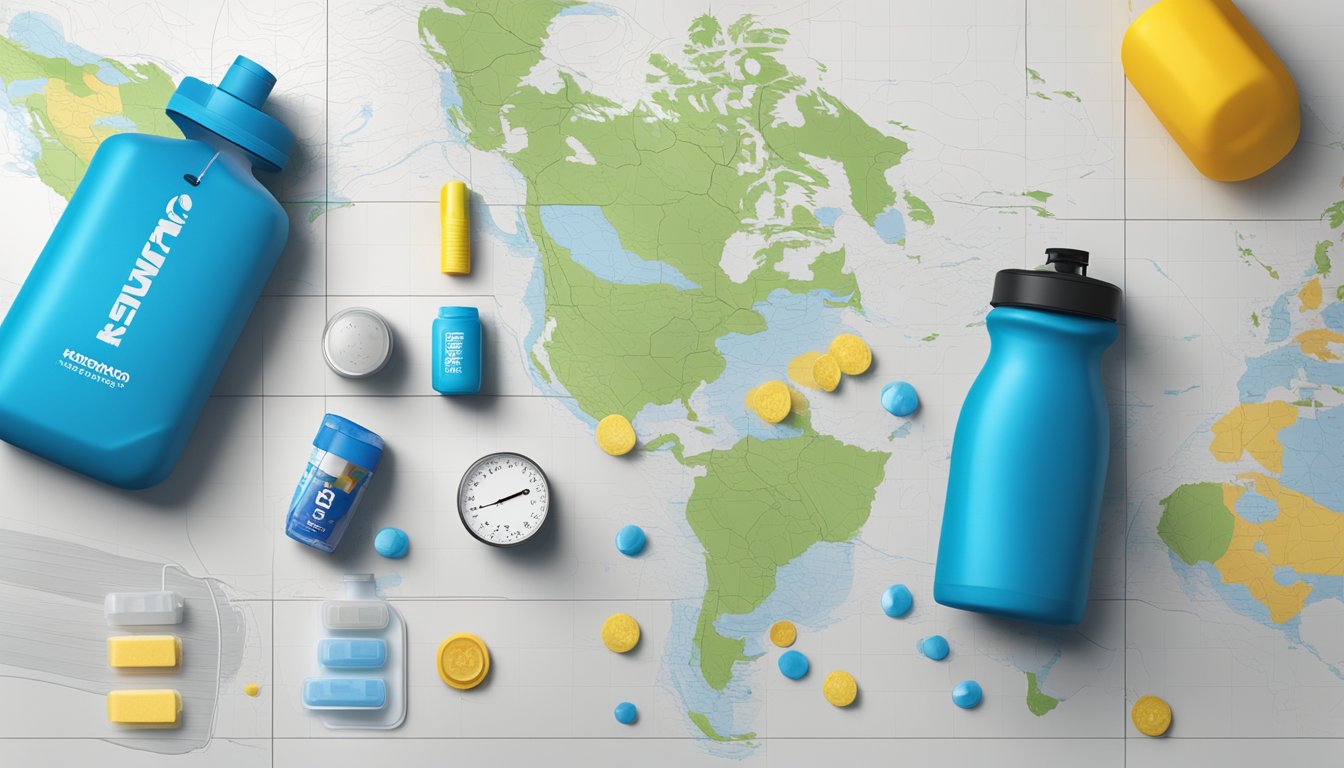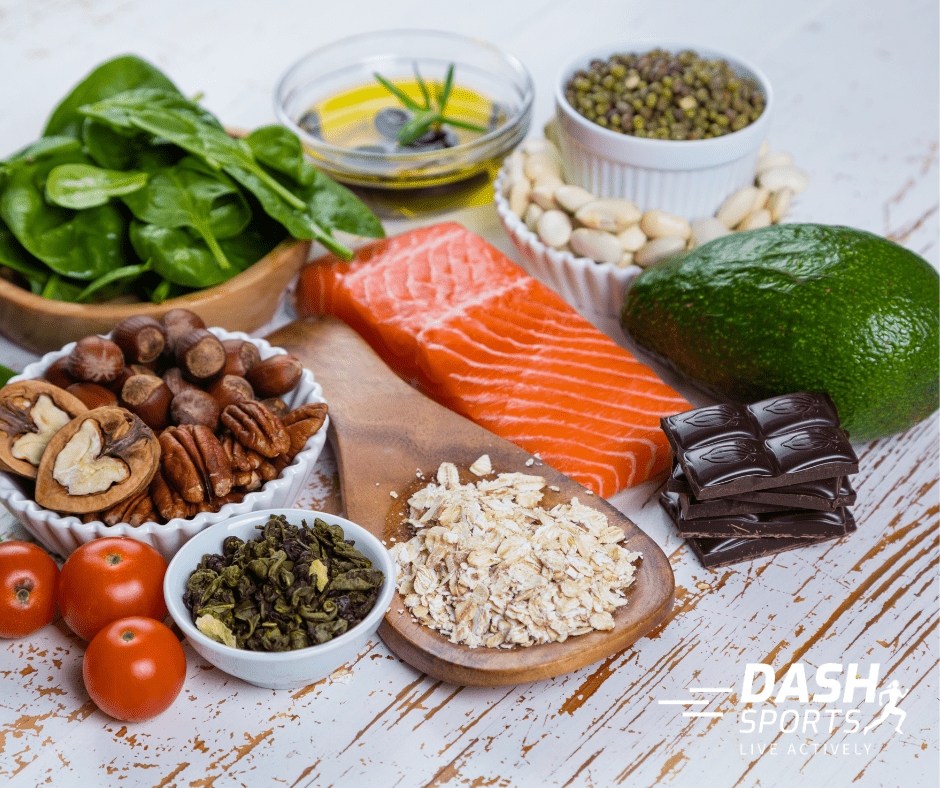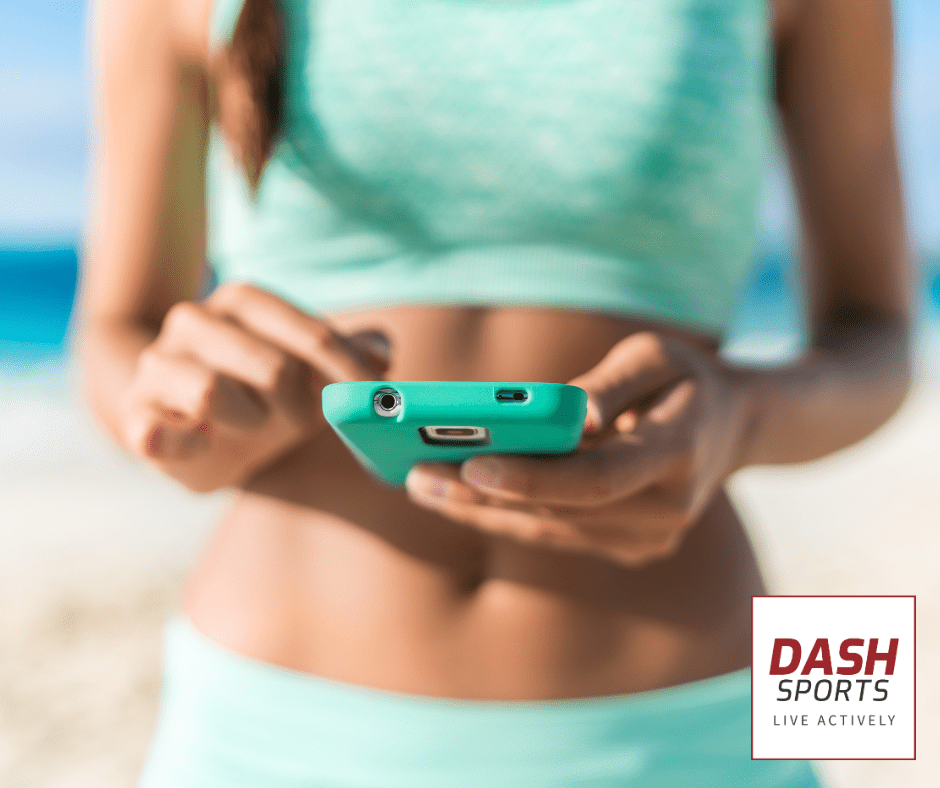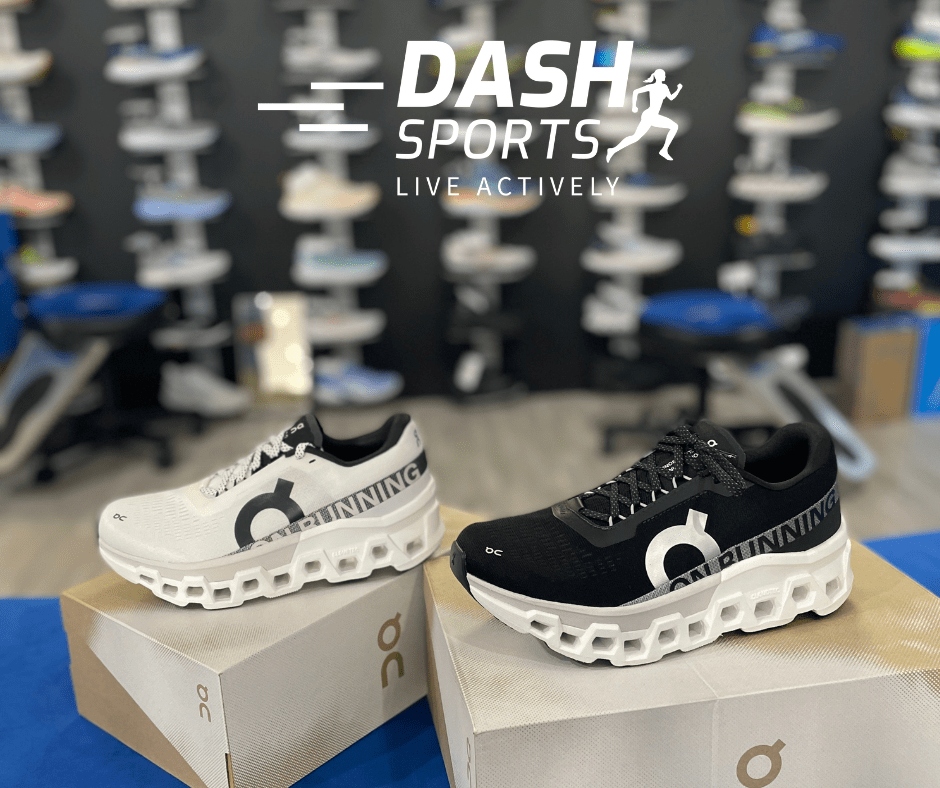Maintaining hydration during long runs is crucial for performance and health.
When you run for extended periods, especially in warm weather, your body loses fluids through sweat.
Replacing these fluids is necessary to maintain blood volume, regulate body temperature, and allow muscle function.
Without proper hydration, you may experience fatigue, cramps, and decreased coordination, leading to subpar performance or even serious health risks.
- Explore Our Store Today
Experience the unique Dash Sports approach with our tailored shoe fitting service.
To hydrate effectively on long runs, you should plan your fluid intake strategy before hitting the pavement or trail.
Carry fluids with you or plot your route where water is available.
Many runners opt for a multiple-bottle belt for hands-free convenience, alternating between water and sports drinks to replenish electrolytes.
It’s also important to listen to your body and drink when thirsty, as too much water can lead to over-hydration, a condition known as hyponatremia.
Understanding your sweat rate can also guide your hydration strategy.
Aim to consume fluids to match your sweat loss, particularly during hot and humid conditions.
Depending on individual needs and environmental factors, this might mean drinking at regular intervals or simply responding to your thirst cues.
Remember, staying hydrated is a day-long process; it doesn’t start and end with your run, so be mindful of your fluid intake throughout the day.
Understanding Hydration and Its Importance for Runners
Hydration is crucial for maintaining your health and optimizing performance during runs.
Proper fluid intake helps regulate your body temperature, reduces the risk of muscle cramping, and ensures efficient recovery.
The Role of Water in the Human Body
Water acts as a vital nutrient in your body, playing a key role in various physiological functions.
It’s essential for transporting nutrients to your cells, regulating body temperature through sweating, and helping the digestive process.
As a runner, your hydration status directly influences these processes, and it’s important to maintain adequate hydration to support these bodily functions.
Hydration vs. Dehydration: Impacts on Performance
Maintaining a balance between hydration and dehydration can be the difference between a successful long run and one hampered by performance issues.
Adequate fluid intake ensures joint lubrication, efficient blood flow, and proper waste removal.
On the contrary, dehydration can lead to decreased stamina, increased body temperature, and excessive sweating, which significantly impair your performance.
Recognizing Dehydration Symptoms and Risks
It’s imperative to recognize the symptoms of dehydration, which can include dizziness, fatigue, and dry mouth.
If you notice any signs, taking immediate steps to rehydrate is essential.
Not only does dehydration affect your immediate running performance, but it can also pose long-term health risks and hinder your recovery efforts post-run.
Hydration Strategies Before the Long Run
Ensuring you’re properly hydrated before setting out on a lengthy run is as critical as the run itself.
A successful hydration strategy will help maintain energy levels, optimize glycogen storage, and keep your body nourished.
Pre-Run Hydration Tips
Aim to drink 16-20 ounces of fluid in the hours leading up to your run.
This should be done 2-3 hours before so that your body has time to absorb the water, reducing the necessity for inconvenient stops during your run.
The goal is to start your exercise fully hydrated without feeling waterlogged.
What to Drink: Water vs. Sports Drinks
The choice between water and sports drinks depends on the duration and intensity of your run.
For most, water will suffice, but if you’re running for more than an hour, consider a sports drink containing carbohydrates and electrolytes.
These will help to replenish your body’s glycogen stores and maintain electrolyte balance, which is crucial for preventing cramps and dehydration.
- Water: Best for short-duration runs or as base hydration.
- Sports Drinks: Ideal for longer runs requiring energy and micronutrient replacement.
Optimizing Your Diet for Effective Hydration
Your diet can significantly affect your level of hydration.
Include nutrient-rich foods high in water content and the necessary minerals to aid in fluid retention.
Moreover, integrate a balance of proteins, carbohydrates, and fats to ensure your body is well-equipped for the upcoming exertion.
Remember to focus on incorporating micronutrients into your meals, as they play pivotal roles in your hydration status and energy levels.
Effective Hydration During the Run
Maintaining proper hydration is critical during a long run to counteract fluid loss through sweat and to maintain electrolyte balance.
Planning your drinking strategy and choosing the right equipment can ensure you stay hydrated without disrupting your stride.
Drinking on the Go: Techniques and Timings
Proper technique is essential when hydrating on the run to prevent gastrointestinal discomfort and to make sure you ingest enough fluid.
Aim to take small sips frequently rather than large gulps to avoid feeling bloated.
Start your drinking plan early in your run and hydrate regularly.
Consuming about 5-10 fluid ounces of water every 15-20 minutes during your long run is recommended, but your exact sweat rate may influence these numbers.
- 0-30 minutes: Depending on weather and intensity, you may not need to hydrate.
- 30-60 minutes: Start drinking small amounts if feeling thirst signals.
- 60+ minutes: Follow a more structured drinking plan, considering electrolytes if sweating heavily.
Choosing the Right Hydration Gear
Selecting hydration gear tailored to your needs is crucial.
If you prefer not to stop, a hydration pack offers a hands-free experience with a straw for easy access.
For those who like the option to carry different fluids, a bottle belt with multiple pouches may work best.
Some runners prefer the simplicity of a handheld bottle, which can be a good choice for shorter long runs or where refill options are readily available.
- Hydration Pack: Ideal for self-sufficient runners on longer, remote routes.
- Bottle Belt: Variable storage, accessible while maintaining your pace.
- Handheld Bottle: Simple, refillable, best for shorter or well-supported runs.
Identifying and Utilizing On-Course Hydration Stations
Pre-run, if you’re in an organized event, familiarize yourself with the course map to locate aid station positions.
During your run, approaching an aid station, reduce your speed for better control when grabbing a cup.
If carrying your own bottle, use these stops for refills to maintain your hydration levels.
Understanding the layout of these stations can optimize your hydration strategy without breaking momentum.
Post-Run Rehydration for Optimal Recovery
Proper rehydration after a long run is crucial to replenish fluids and electrolytes lost during exercise and to facilitate muscle recovery.
Using specific strategies can prevent dehydration-related issues such as fatigue and cramping, ensuring you’re ready for your next workout.
Assessing Fluid and Electrolyte Loss After Running
After your run, it’s important to estimate how much fluid you’ve lost and to replenish accordingly.
A practical way to gauge this is to weigh yourself before and after your run—a loss of one pound equates to about 16 ounces of water.
Remember to replace not just fluids but also essential electrolytes like sodium and potassium, which are critical to nerve function and muscle contractions.
Recovery Drinks and Foods That Help Rehydrate
For effective rehydration, consider a recovery drink that includes a balance of electrolytes and carbohydrates.
These can be commercial sports drinks or a homemade blend.
Additionally, you can opt for recovery foods; fruits like bananas are high in potassium, and a small handful of salted nuts can provide both sodium and protein, aiding in your recovery process.
Hydration’s Role in Muscle Recovery and Soreness Prevention
Staying hydrated helps diminish the risk of muscle soreness and aids in muscle recovery.
Consuming fluids with added protein within 30 minutes post-run can kickstart muscle repair.
Be mindful of your nutrition – proper hydration is more than water. It’s about maintaining the right balance of fluids and nutrients to keep your muscles functioning optimally post-exercise.
Monitoring and Adjusting Hydration Levels
Proper hydration is essential for long-distance runners. It’s vital to monitor and adjust your fluid intake before, during, and after runs to avoid dehydration or overhydration, which can upset your blood sodium levels.
Below are specific strategies to help you stay in the hydration sweet spot.
Using Urine Color as a Dehydration Indicator
Your urine color is a reliable indicator of your hydration status. Aim for a pale straw color—signifying adequate hydration. A darker color suggests dehydration and necessitates an increase in fluid intake, but be cautious not to overhydrate.
Carry fluids with you during long runs; if you notice darker urine pre-run, it’s crucial to hydrate adequately beforehand.
- Hydrated: Pale, straw-colored urine
- Dehydrated: Dark yellow or amber-colored urine
- Overhydrated: Transparent or colorless urine
Listening to Your Body: Thirst and Beyond
Thirst is your body’s most immediate signal to indicate it needs fluids. However, waiting until you’re thirsty to drink might not be the best strategy during long runs.
Additionally, signs of dehydration can include fatigue, headache, and dizziness. Over-hydrating, on the other hand, can lead to hyponatremia, where the blood sodium levels become too low.
Balance is key; drink when you feel the early signs of thirst and match your drink intake to the intensity of your run and sweat loss.
Planning for Weather and Environmental Variables

Understanding how the weather and environment affect your hydration needs is crucial when preparing for a long run. These variables can significantly influence how much and how often you should drink, as well as what fluids to consume to maintain optimal hydration levels.
Hydrating Effectively in Heat and Humidity
In high temperatures, your body sweats more to cool down, increasing fluid loss.
Particularly when it’s also humid, your sweat doesn’t evaporate as quickly, leading to less efficient cooling.
This makes it vital to hydrate effectively, aiming for 400ml to 800ml of water per hour while also replenishing electrolytes.
The latter can often be overlooked, but remember that sodium loss through sweat necessitates an intake of 300-600mg of sodium per hour to prevent cramping and fatigue.
Adjusting Hydration Needs Based on Temperature and Altitude
Your hydration strategy should adapt to changes in temperature and altitude.
Cooler temperatures may mask sweat loss, leading to under-hydration if you don’t monitor your intake.
Conversely, running at altitude accelerates dehydration due to increased respiration rates and diuresis (urine production), so increasing fluid intake is key.
Do listen to your body and adjust to the separate demands these conditions place on your hydration needs, especially as you train for a marathon or similar physical activity.
Keep an eye on the sun’s position, too; avoid peak sun hours to reduce the risk of overheating and excessive fluid loss.
Advanced Hydration Techniques for Endurance Running
To excel in endurance running, you need a hydration strategy that goes beyond simply drinking water. Understanding how to effectively combine fluid intake with additional supplementation will enhance your performance, especially during a marathon or an ultra-distance race.
Hydration Planning for Marathon and Ultra Distances
Hydration planning is crucial for the success of any long-distance event.
Tailor your fluid intake to your specific needs and consider the race conditions.
Start your race well-hydrated by drinking 16-20 ounces of fluids a few hours prior and maintain hydration with small, frequent sips throughout the race.
For marathons and ultra distances, your strategy should also include places where you can replenish your fluids, either through water stations or by carrying your own supplies.
Plan to take in fluids at least every 15-20 minutes, aiming for 4-6 ounces per intake.
Supplementing Water Intake with Energy Gels and Electrolytes
Combining water with energy gels and electrolytes is essential for maintaining your performance during long runs.
Energy gels should be consumed every 45-60 minutes to keep glycogen levels stable.
Electrolyte replacement is key to preventing hyponatremia and muscle cramps, especially as you lose salt through sweat.
Look for products that contain sodium, potassium, and other vital nutrients, and aim to consume an electrolyte-rich beverage or supplement during the latter half of your race.
Remember to have a trial run of these supplements during training to ensure they agree with your system.
Avoiding Common Hydration Mistakes
Making the right decisions about hydration can make or break your long runs. Understand the risks of overhydration, learn about hyponatremia, and manage caffeine consumption to optimize your performance.
The Truth About Hyponatremia and Overhydration
Hyponatremia is a condition that occurs when your sodium levels are abnormally low, a potential consequence of overhydration.
Your body needs a delicate balance of electrolytes, and drinking too much water can dilute sodium in your system, leading to symptoms like headaches, confusion, seizures, and, in extreme cases, death.
To mitigate this risk, consider carrying a hydration pack that allows you to drink small, frequent sips rather than large amounts at once.
- Aim for 16 to 24 ounces of fluid per hour, depending on conditions and sweat rate.
- Include an electrolyte source if running for more than an hour or in hot conditions.
Be alert to your body’s thirst signals, and be mindful not to exceed these guidelines.
Navigating the Balance Between Hydration and Caffeine Consumption
While coffee might be your preferred pre-run boost, it’s important to understand caffeine’s diuretic effect.
While moderate caffeine consumption can have performance benefits, too much may lead to dehydration.
If you choose caffeinated beverages like coffee or even lemonade with added caffeine, balance it with water to offset potential dehydration.
- Limit caffeine to 3-6 mg/kg of body weight pre-run (experts suggest this dose for optimizing performance).
- Hydrate with non-caffeinated fluids post-run to ensure recovery; for example, if you weigh 150 pounds, aim for 10.5 to 21 ounces of fluid after your run, as noted by nutrition guidance.
Personalizing Your Hydration Plan

Every runner has unique hydration needs that must be considered to optimize performance and safety during a training run. To tailor your hydration strategy effectively, it’s essential to determine your specific sweat rate and understand how different runner types may require distinct approaches to hydration.
Assessing Individual Sweat Rates and Electrolyte Needs
Your sweat rate is a key factor in creating a personalized hydration plan.
To calculate this, measure your body weight before and after a run to see how much fluid you’ve lost.
Remember that a loss of 16 to 24 ounces of water for every pound of body weight lost is significant and requires rehydration. You can also track the color of your urine as a quick dehydration check; darker urine suggests you need to drink more.
Alongside understanding your sweat rate, it’s imperative to note your electrolyte needs.
Electrolytes, like sodium and potassium, are essential to maintain bodily functions and avoid dehydration.
Pay attention to any signs of an electrolyte imbalance, such as cramping or fatigue, and consider adding electrolyte-rich drinks or foods to your hydration strategy if needed.
Hydration Considerations for Different Runner Types
Runners vary in size, speed, and metabolism, affecting their hydration needs.
If you’re a long-distance runner, you may have a higher sweat rate, requiring more fluids, and you might consider using a hydration pack to maintain hydration without interrupting your run.
For shorter, high-intensity runs, hydration is still key, but you may not need to carry fluids with you. Instead, focus on pre-run and post-run hydration.
Be mindful that factors like weather conditions and your running pace can also impact your hydration needs. Hot and humid weather increases sweat loss, while colder climates might mask sweat rates, leading to underestimating fluid needs.
Drink to thirst, and adjust your intake based on your specific conditions and how you feel during the run. Remember that it’s better to prevent dehydration rather than try to compensate for it afterward.
Frequently Asked Questions
In this section, you will find answers to the most common queries about hydration strategies for long-distance running. These tips are meant to guide you so that you can focus on your performance without worrying about dehydration.
Should I drink water before going for a long run?
To start a long run well-hydrated, it’s recommended that you drink about 16-20 ounces of water a couple of hours beforehand. This allows time for the body to process the fluid.
What are effective ways to carry water while running long distances?
Runners have various options to stay hydrated without hindering their run. Hydration vests or belts are popular, as well as handheld water bottles specifically designed for runners.
How often should I hydrate during a long run?
Hydration needs can vary, but a general rule is to take in fluids every 20 to 30 minutes during a long run. Adjust based on your sweat rate and the conditions.
What techniques do marathon runners use to stay hydrated?
Marathon runners often rely on a structured hydration strategy. This includes consuming a carbohydrate drink or electrolyte-enhanced fluids at regular intervals to maintain balance.
How much water should I drink daily as a runner for optimal hydration?
A daily intake of around half an ounce to an ounce of water per pound of body weight is suggested for runners. Increase this amount on running days for optimal hydration.
How should I plan my hydration for a morning long run?
For a morning run, ensure you’re hydrating the night before.
On the morning of, aim to drink another 16-20 ounces of fluids about an hour before starting your run.





